
The Fletcher Union Church, also known as the Fletcher Community House, is a historic former church building on TH 1 in Fletcher, Vermont. Built in 1871, it is one of only a few public buildings in the small community, and has for over a century been a secular community meeting space. It was listed on the National Register of Historic Places in 1982.
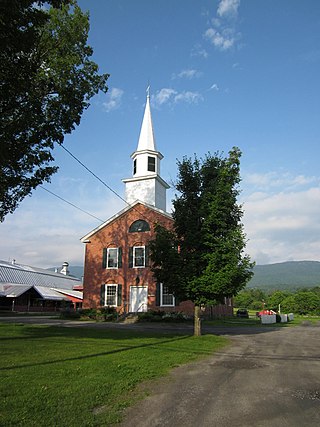
The Waterbury Center Methodist Church, now the Waterbury Center Community Church, is a historic church building in Waterbury Center, Vermont. Built in 1833, it is a prominent visual landmark in the village, and a good local example of Federal period church architecture. It was listed on the National Register of Historic Places in 1978.

The Hutchinson House is a historic house at 400 Alstead Center Road in Alstead, New Hampshire, United States. Built in 1805–09, it is one of a small number of Georgian houses in southwestern New Hampshire. It was added to the National Register of Historic Places in February 2015.

The Deacon John Holbrook House is a historic building at 80 Linden Street in Brattleboro, Vermont. Built in 1825 for prominent local businessman John Holbrook, it is a high-quality example of Federal period architecture. It was listed on the National Register of Historic Places in 1982. It now houses professional offices.
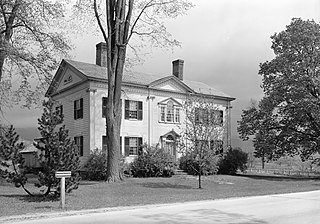
The Munro-Hawkins House is a historic house on Vermont Route 7A in southern Shaftsbury, Vermont. Built in 1807, it is a well-preserved example of transitional Georgian-Federal period architecture, designed by local master builder Lavius Fillmore. It was listed on the National Register of Historic Places in 1973.

The Simeon Smith Mansion is a historic farm property on Smith Road in West Haven, Vermont. The property, more than 100 acres (40 ha) includes a farmhouse dating to the 1790s, which was the seat of Simeon Smith, a prominent local doctor, politician, and landowner. The property was listed on the National Register of Historic Places in 1991.

The Chester Village Historic District encompasses the historic southern portion of the main village of Chester, Vermont, US. Essentially a linear stretch of Main Street, this area includes some of the village's oldest buildings and has an architectural history spanning into the early 20th century. The district was listed on the National Register of Historic Places in 1985.
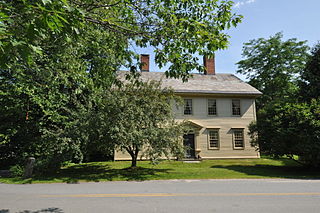
The Joseph Fessenden House is a historic house at 58 Bridge Street in Royalton, Vermont. Built about 1802, it is a high quality local example of transitional Georgian-Federal architecture. It was listed on the National Register of Historic Places in 2002.
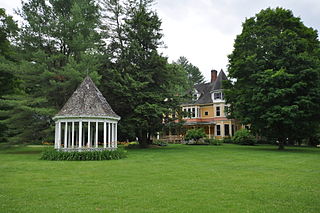
The Harrington House is a historic house at 88 North Road in Bethel, Vermont. Built in 1890–91, it is a fine example of high-style Queen Anne Victorian architecture, a relative rarity in the state. The house was listed on the National Register of Historic Places in 1983. Its most recent additions have included a restaurant, bed and breakfast inn.

Juniper Hill Farm, also known historically as Juniper Hill Inn and the Maxwell Evarts House, is a historic estate and mansion house on Juniper Hill Road in Windsor, Vermont. Built in 1902 by Maxwell Evarts, it is a large and elaborate example of Colonial Revival architecture. Evarts was a prominent New York lawyer, who played host to two presidents of the United States here. The property has seen a variety of commercial uses since the death of Evarts' son in 1936. In 2016, it reopened as the Windsor Mansion Inn with new owners. It was listed on the National Register of Historic Places in 1988.

The Gen. Lewis R. Morris House is a historic house and farm property at 456 Old Connecticut River Road in Springfield, Vermont. Its main house, built in 1795, is well-preserved local example of Federal architecture with later Greek Revival features. The property also includes well-preserved 19th-century agricultural buildings, and was listed on the National Register of Historic Places in 1992.

The Elwin Chase House is a historic house at 366 Topsham-Corinth Road in Topsham, Vermont. Built about 1830, it is a well-preserved example of Greek Revival architecture in a rural context. It is most prominent as one of the only known sites in Vermont of the artwork drawn by Rufus Porter, who worked as an itinerant muralist around the time of the house's construction. The house was listed on the National Register of Historic Places in 1977.

The Jedediah Strong II House is a historic house at the junction of Quechee Main Street and Dewey's Mill Road in Hartford, Vermont. Built in 1815 by a local mill owner, it is a fine local example of a high-style Federal period brick house. It was listed on the National Register of Historic Places in 1974. It now houses professional offices.
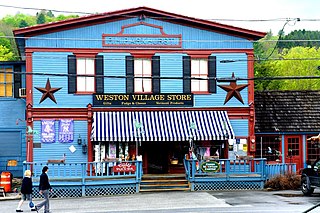
The Weston Village Historic District encompasses the town center and principal village of Weston, Vermont. Centered on Farrar Park, which serves as the town green, it includes a diversity of architectural styles from the late 18th century to about 1935, and includes residential, civic, commercial, industrial and religious buildings. It was listed on the National Register of Historic Places in 1985.
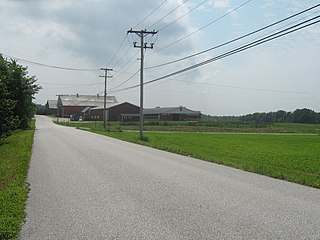
The Ballard Farm is a historic farm property on Ballard Road in Georgia, Vermont. At the time of its listing on the National Register of Historic Places in 1993, it had been under cultivation by members of the Ballard family for more than 200 years, having been established in 1788 by a sale from Ira Allen to Joseph Ballard.

The Parley Davis House is a historic house on Center Road in East Montpelier, Vermont. Built in stages between 1795 and about 1805, it is one of the oldest buildings in the community, built by one of the first settlers of Montpelier, and served as the site of town government until 1828. It was listed on the National Register of Historic Places in 1989.

The Solomon Goodrich Homestead is a historic house at 4787 Ethan Allen Highway in Georgia, Vermont. With its oldest section dating to the late 1780s, it is one of the community's oldest surviving buildings. Its later and more prominent brick front is a good early example of Federal period architecture. The house was listed on the National Register of Historic Places in 2004.

Hathaway's Tavern is a historic public accommodation at 255 North Main Street in the city of St. Albans, Vermont, United States. Built in 1793, it is the city's oldest surviving building, and was briefly used as the seat of the Franklin County government. A private residence since 1805, it was listed on the National Register of Historic Places in 1983.

The McNeil Homestead is a historic ferry-related property off Wings Point Road in Charlotte, Vermont, USA. The complex includes a 19th-century house, former tavern, and barn, all built by members of the McNeil family, the first operators of the Charlotte-Essex Ferry, whose eastern terminus is just south of the property. It was listed on the National Register of Historic Places in 1982.

The Tavern on Mutton Hill, also known locally as the 1812 Tavern, is a historic former public accommodation on Church Hill Road in Charlotte, Vermont. Built in 1813, it is a prominent local example of Federal period architecture, and the town's only documented 19th-century tavern house built out of brick. It was listed on the National Register of Historic Places in 1982.























